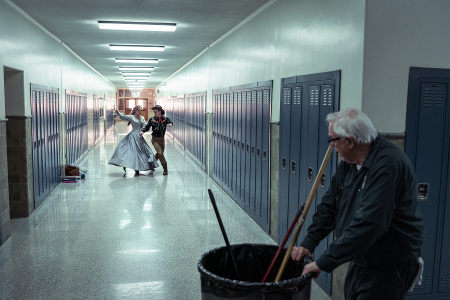366 Weird Movies may earn commissions from purchases made through product links.

DIRECTED BY: Hans-Jürgen Syberberg
FEATURING: André Heller, Peter Kern, Heinz Schubert, Hellmut Lange, narrated by Hans-Jürgen Syberberg
PLOT: Hitler’s youth, rise, fall, and aftermath are all explored via inter-related vignettes, monologues, stage props, and puppets.

WHY IT MIGHT JOIN THE APOCRYPHA: Syberberg’s epic is a documentary with an impossible task: capturing the full scope and legacy of the 20th-century’s most dangerous maniac. Eschewing the standard “narrated historical footage interspersed with talking heads,” the film instead aims to recreate the febrile mindset inspired by Adolf Hitler by dabbling in surrealism, cosmic imagery, mundane detail, historical cinematic allusions, and ironic counterpoint. There are also puppet facsimiles of all the Reich’s leading men.
COMMENTS: This film from Germany is, on the surface, very simple. It has no elaborate special effects. Its main set is a theater strewn with props. It uses widely available historic footage and broadcasts. It states from the start that its mission is impossible. The events leading up to Hitler’s rise, and the fallout from his catastrophic machinations, cannot be recreated in any conventional way. So Syberberg takes advantage of both his limited budget (some half-a-million dollars) and his task’s inherent difficulties to craft a reverie that fuses cosmic grandeur with the tedium of minutiae. In doing so, he has created not so much a documentary of events as a dreamscape that lands the viewer face to face with the 20th century’s greatest evil.
A ring master invites the viewer to the forthcoming spectacle, encouraging us to take part at home. Barking through a megaphone, he promises outlandish sights and sounds. Entertainment, through sketch, monologue, and marionettes, awaits. Vintage radio broadcasts blast breathtaking news of conquest and hate, while a young girl clad in a celluloid headdress wanders amidst symbolic props and across idyllic rear-projected landscapes. Academics chime in, typically directly at the camera, other times in conversation with a carved wooden Führer. Various actors play various iterations of Himmler. Hitler’s valet leads us on of his bunker and explains the Führer’s exasperating disinclination to wear the correct shoes. A likeness of Doctor Caligari presents his own side-show of esoteric relics, from the historical spear that stabbed Jesus Christ to the bottle of Hitler’s semen—not the real thing, mind you, as that has been preserved in a capsule frozen in an alpine glacier and protected by elite guards. For over seven hours, Syberberg builds a mindscape from snippets of Wagner, snatches of Goethe, and reams of autobiographical testimony from those closest to the Führer.
There is a climactic scene of sorts, involving a conversation between a scholar and the little Hitler perched upon his knee. The academic argues that, despite all Hitler’s ambitions, and with all the idiotic mistakes he made (for example, rallying against the Jews instead of co-opting them), he failed. During Hitler’s lengthy rejoinder, in which he expounds upon the reality he established even upon his death, the academic removes coat after coat from the doll, taking its garb backward further and further along Hitler’s historical sartorial path. This contrast of contemporary and future with historical delving is Syberberg’s primary tool. Despite virtually all the facts available to us—the thousands of hours of film, the unending radio transmissions, the millions of words written by observers from all sides—there is a disconnect, as if the catalyst is missing. There was a time before Hitler, there was a time after Hitler.
By the end, I was well and truly transported. Watching Hitler: a Film from Germany is, despite the bare-bones production, a transcendental experience. Each of the four acts is the length of any one standard feature film, but Syberberg had his hooks in me—so much so that I watched it all in one sitting. The art-house speeches, effective in their matter-of-fact tones and melancholy delivery; the fusion of man and doll when the Reich’s ministers expound on their greatness; the conventional drama of the scenes that still subvert with their dissonant aural cues or ironic back-projection; this all adds up to a heady experience that should be mandatory viewing for any student of history, contemporary politics, psychology, or cinema. Hitler: a Film from Germany deftly and thoroughly examines how one man’s dream of destroying the world order succeeded despite his own downfall.
WHAT THE CRITICS SAY:




